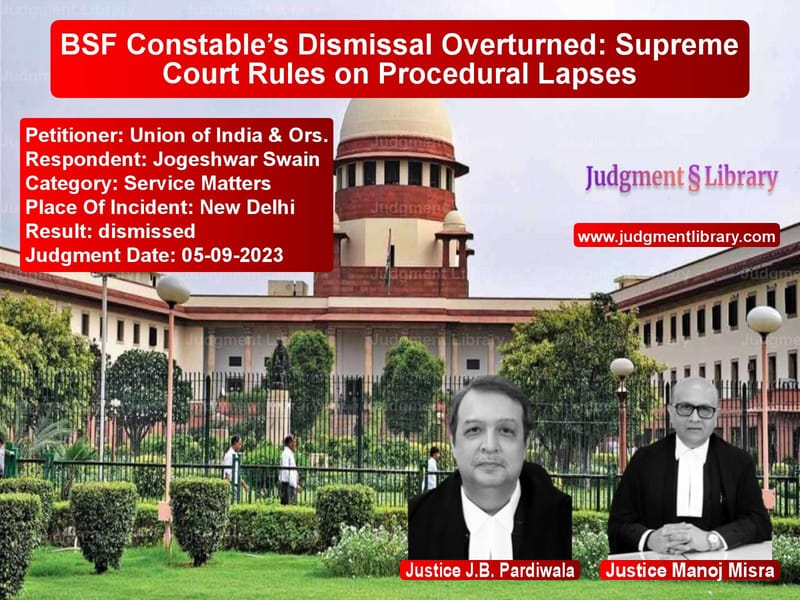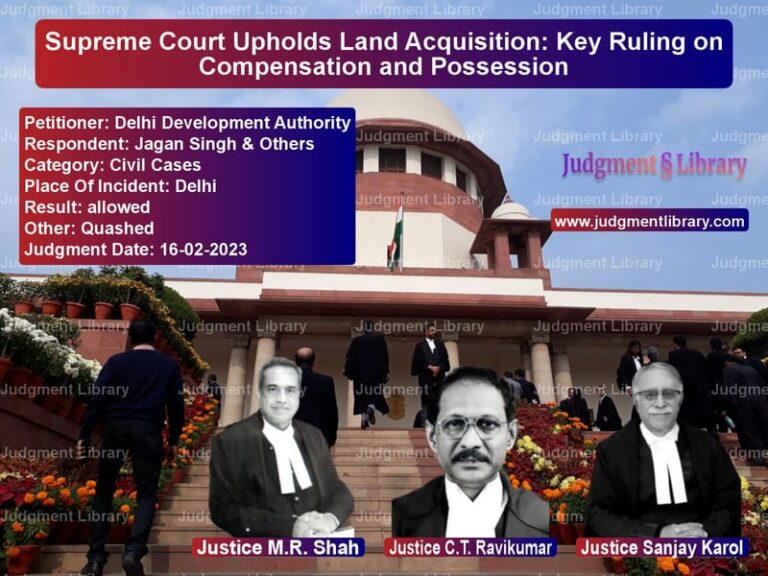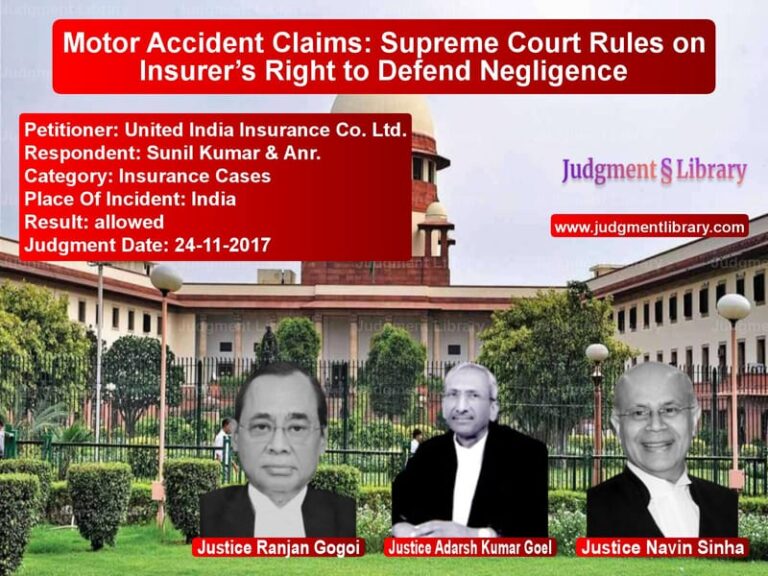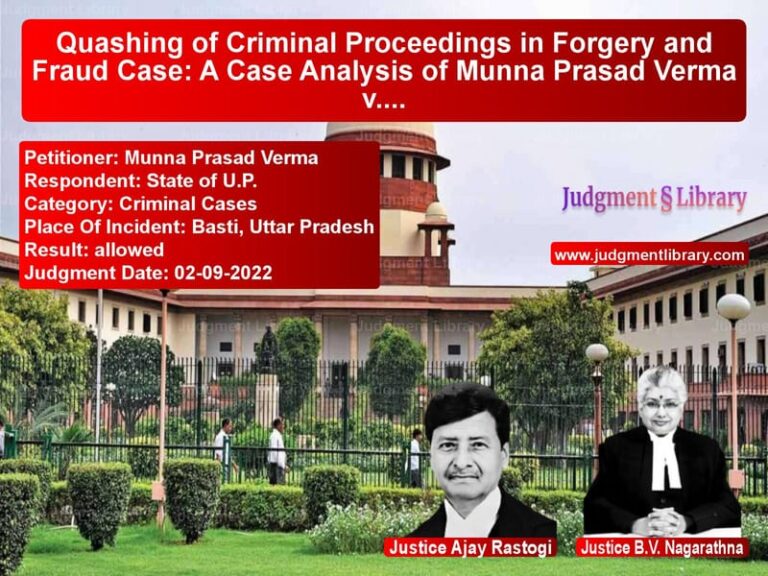BSF Constable’s Dismissal Overturned: Supreme Court Rules on Procedural Lapses
The Supreme Court in Union of India & Ors. vs. Jogeshwar Swain delivered a significant ruling concerning the procedural fairness of disciplinary proceedings under the Border Security Force (BSF) Act, 1968. The judgment revolved around the dismissal of a BSF constable on allegations of misconduct and the alleged procedural lapses in his summary trial.
Background of the Case
The case arose from an incident on June 17, 2005, when the respondent, Jogeshwar Swain, a BSF constable, was accused of taking unauthorized photographs of a lady doctor while she was taking a bath. Following an internal investigation, Swain was charged under Section 40 of the BSF Act, which pertains to acts prejudicial to the good order and discipline of the Force.
The BSF authorities conducted a Summary Security Force Court (SSFC) trial on July 23, 2005, where the accused allegedly pleaded guilty. Based on this plea, Swain was dismissed from service. His appeal under Section 117 of the BSF Act was also rejected, prompting him to challenge the dismissal before the Delhi High Court.
Legal Issues Raised
The Supreme Court was called upon to decide:
- Whether the procedural safeguards under the BSF Act and Rules were followed during the trial.
- Whether the alleged confession by the accused was voluntary and legally valid.
- Whether the absence of corroborative evidence warranted setting aside the dismissal.
- Whether the High Court was justified in intervening in a disciplinary matter.
Petitioner’s Arguments (Union of India & BSF)
The Union of India and the BSF authorities contended:
- The accused had voluntarily pleaded guilty before the SSFC, and there was no need for further evidence.
- Procedural requirements under the BSF Act and Rules were duly followed.
- The confession, even if unwritten, was valid under the existing BSF Rules at the time.
- Given the serious nature of the offense—a breach of trust and discipline—dismissal was the only appropriate punishment.
Respondent’s Arguments (Jogeshwar Swain)
The respondent countered:
- The trial was procedurally flawed as he was not given 24 hours for reflection before making any alleged confession.
- No incriminating evidence was recovered from him.
- The alleged plea of guilty was not signed by him, violating procedural fairness.
- The BSF Commandant, who had ordered his arrest and inquiry, also presided over his trial, violating natural justice.
- Given the lack of substantive evidence, the High Court was justified in overturning the dismissal.
Supreme Court’s Ruling
The Supreme Court upheld the High Court’s findings and ruled in favor of the respondent.
1. Procedural Violations in the Trial
- The Court found that the accused was not given 24 hours for reflection before recording his statement, as mandated under Rule 49(3) of the BSF Rules, 1969.
- The alleged plea of guilty was not signed by the accused, casting doubt on its voluntary nature.
- The trial was presided over by the same Commandant who had ordered the investigation, violating natural justice.
2. Lack of Evidence Against the Accused
- No eyewitness testified to seeing the accused taking photographs.
- The camera was found in another person’s house, and there was no proof of its ownership.
- The camera reel was never developed, meaning there was no direct evidence linking the accused to the act.
3. Absence of Signed Confession
- The Court noted that under Rule 142 of the BSF Rules, an accused must understand the consequences of pleading guilty.
- The plea of guilty was not signed by the accused, making its validity questionable.
- The absence of written confirmation undermined the claim that the accused had voluntarily admitted guilt.
4. Violation of Natural Justice
- The BSF Commandant acted as judge, investigator, and accuser, violating the principles of fair trial.
- The accused was denied the opportunity to cross-examine prosecution witnesses.
5. Supreme Court’s Final Verdict
The Supreme Court:
- Dismissed the appeal filed by the Union of India.
- Reaffirmed the High Court’s ruling setting aside the dismissal.
- Directed that the respondent be reinstated with full service benefits but only 50% of back wages.
Impact of the Judgment
The ruling has significant implications for disciplinary proceedings:
- Reinforcement of procedural safeguards: Authorities must strictly adhere to procedural rules before taking disciplinary action.
- Protection against coerced confessions: The ruling emphasizes that guilty pleas must be voluntary, informed, and documented.
- Upholding of natural justice: The case reaffirms that no individual should be judged by an officer involved in their prosecution.
Conclusion
The Supreme Court’s decision in Union of India & Ors. vs. Jogeshwar Swain is a landmark ruling ensuring procedural fairness in disciplinary proceedings. By overturning the dismissal and highlighting procedural lapses, the Court has reinforced the principles of due process, fair trial, and natural justice. The case serves as a reminder that authorities must strictly comply with legal safeguards before imposing penalties on personnel.
Petitioner Name: Union of India & Ors..Respondent Name: Jogeshwar Swain.Judgment By: Justice J.B. Pardiwala, Justice Manoj Misra.Place Of Incident: New Delhi.Judgment Date: 05-09-2023.
Don’t miss out on the full details! Download the complete judgment in PDF format below and gain valuable insights instantly!
Download Judgment: union-of-india-&-ors-vs-jogeshwar-swain-supreme-court-of-india-judgment-dated-05-09-2023.pdf
Directly Download Judgment: Directly download this Judgment
See all petitions in Disciplinary Proceedings
See all petitions in Public Sector Employees
See all petitions in Termination Cases
See all petitions in Employment Disputes
See all petitions in Judgment by J.B. Pardiwala
See all petitions in Judgment by Manoj Misra
See all petitions in dismissed
See all petitions in supreme court of India judgments September 2023
See all petitions in 2023 judgments
See all posts in Service Matters Category
See all allowed petitions in Service Matters Category
See all Dismissed petitions in Service Matters Category
See all partially allowed petitions in Service Matters Category







